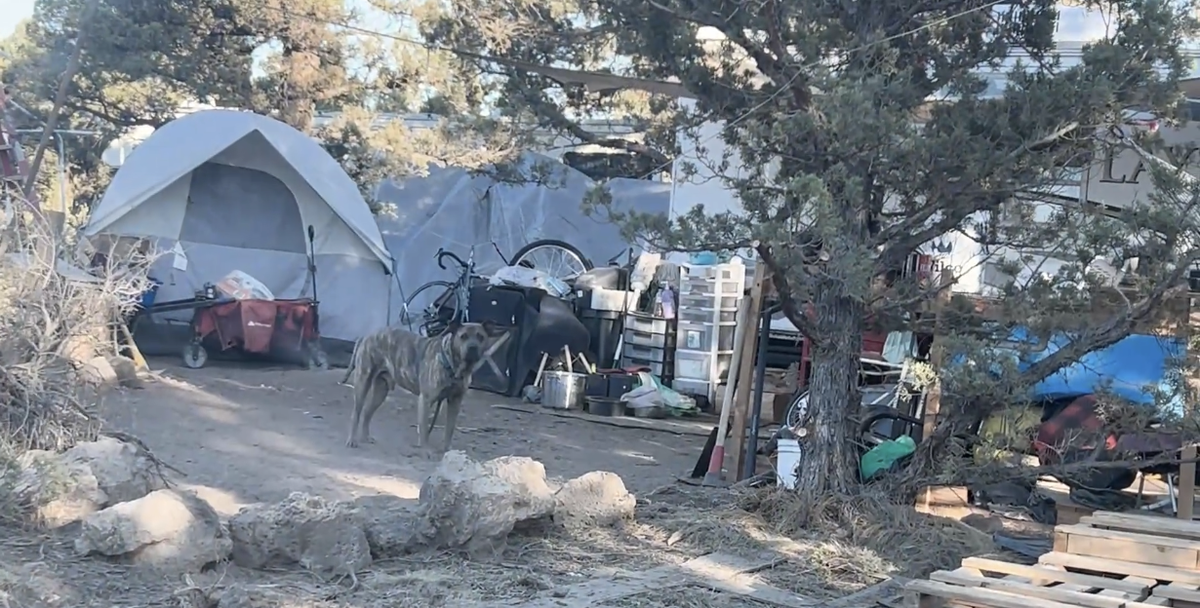Bend City Council discusses plans to close Juniper Ridge’s ‘Dirt World’ but may extend closure deadline

Tracee Tuesday
BEND, Ore. (KTVZ) — Bend city councilors got a staff update Wednesday evening on the progress and challenges seen at the “Temporary Safe Stay Area” established at Juniper Ridge, which has a higher homeless population than expected – 231 at last count – making it even harder to solve the big question: What next?
There are hopeful signs, from more people receiving help and finding permanent housing elsewhere to quicker response when fires occur in the area of Juniper Ridge known to some as ‘Dirt World.’
Many of the homeless have found hope, help and some sense of safety, if not a new home elsewhere. But community members say it’s still a nuisance, a health concern, and dangerous.
One of the main issues on the agenda addressed city staff recommendations as to how to clear and close the homeless camp no later than a late 2026 deadline set last fall by city and Deschutes County leaders.
Here’s a bit of background:
The Bend City Council and Deschutes County Board of Commissioners jointly adopted a resolution in 2024 establishing the temporary safe stay area (TSSA), which provides temporary overnight vehicle camping on publicly owned land in Juniper Ridge.
But when the US Forest Service permanently shut down the China Hat homeless camp in May 2025, some of those people moved to the Juniper Ridge TSSA. A similar shift occurred when the city previously cleared out those living in RVs along Hunnell Road.
Occupancy increased from an estimated 100 to more than 230 people.
So far, out of a budgeted $1 million, the city has already spent half a million dollars on closing and cleaning up the approximately 800 acres of city-owned property at Juniper Ridge outside of the TSSA (east of the railroad tracks) and to maintaining the safe stay area.
Asked how it could look if a portion of the TSSA was temporarily extended beyond 2026 and what that would mean, Matt Stuart, Real Estate & Housing Director for the City of Bend, explained:
“The costs involved with just being able to provide the hygiene stations, which include providing water, handwashing stations and bathrooms for porta potties for individuals, as well as trash and cleanup, so we can maintain the area in an effective manner. The cost also includes having a service provider continue to do case management, so trying to continue to find housing for those individuals. And then those dollars are just around the overall management in hiring the security and other staff that are present to kind of keep things in order. So, we estimate that would be about half million to a million a year.”
Here are the current challenges:
Over population
Enforcing rules
Land management cost
Housing/shelter options
City staff must also enforce the rules which include:
All pets on leashes
No creating new structures or roads, or camping in tents
Failing to utilize hygiene stations
No dumping
To close the TSSA by November of 2026 staff recommends:
Increase the land management budget by 500,000 dollars – adding to the existing budget of $1million, Totaling $1.5 million
Adding full-time (40 hours a week) staff members to help manage the TSSA camp
Creating more housing for the displaced.
During the meeting, Bend City Council floated the idea of extending a portion of the TSSA past the 2026 deadline to give people more time to find housing.
If the city were to go this route, it’s looking at a smaller version of a camp around 60-70 acres – accommodating just over a hundred people, which would cost the city a half million to a million dollars a year to maintain.
The city recommends that the first phase of notifications of closure will begin in March of 2026.
Bend City Councilors will meet with the Deschutes County Commissioners on September 29th, for an update and to present their recommendations from Wednesday night’s meeting.